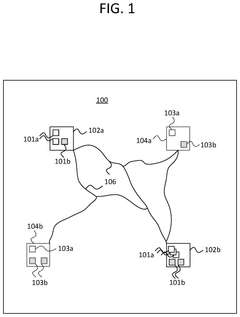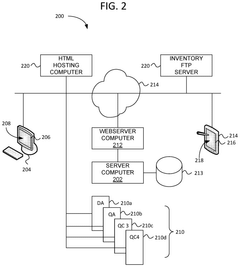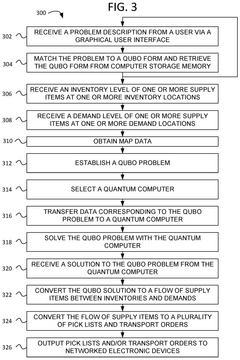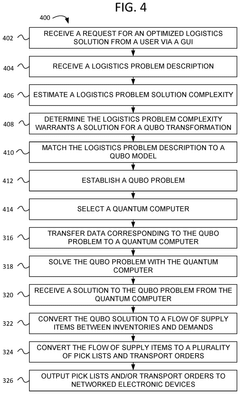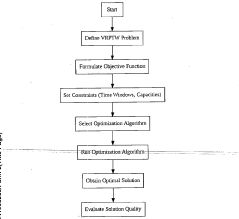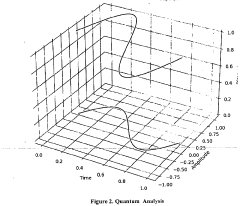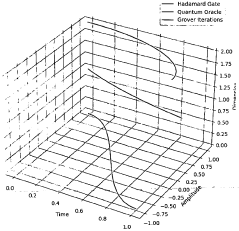Quantum Computing and Logistics: Revolutionizing Operations Management
JUL 17, 202510 MIN READ
Generate Your Research Report Instantly with AI Agent
Patsnap Eureka helps you evaluate technical feasibility & market potential.
Quantum Computing in Logistics: Evolution and Objectives
Quantum computing has emerged as a revolutionary technology with the potential to transform various industries, including logistics and operations management. The evolution of quantum computing in logistics can be traced back to the early 2000s when researchers began exploring its theoretical applications in optimization problems. Over the years, the field has progressed from conceptual frameworks to practical implementations, driven by advancements in quantum hardware and algorithms.
The primary objective of integrating quantum computing into logistics is to address complex optimization challenges that classical computers struggle to solve efficiently. These include route optimization, supply chain management, and resource allocation. By leveraging quantum principles such as superposition and entanglement, quantum computers can potentially process vast amounts of data and explore multiple solutions simultaneously, leading to more efficient and cost-effective logistics operations.
One of the key milestones in the evolution of quantum computing in logistics was the development of quantum annealing algorithms, particularly by D-Wave Systems in the mid-2000s. These algorithms showed promise in solving combinatorial optimization problems, which are prevalent in logistics. Subsequently, gate-based quantum computers, developed by companies like IBM and Google, opened up new possibilities for more diverse and sophisticated logistics applications.
The technological trajectory of quantum computing in logistics has been marked by increasing qubit counts, improved coherence times, and the development of error correction techniques. These advancements have gradually expanded the scope of problems that can be addressed, moving from simple toy models to more realistic logistics scenarios. However, significant challenges remain in scaling quantum systems to handle real-world logistics problems at an industrial scale.
Current objectives in the field focus on developing quantum algorithms specifically tailored for logistics problems, such as the Quantum Approximate Optimization Algorithm (QAOA) and variational quantum eigensolvers. These algorithms aim to demonstrate quantum advantage in solving logistics optimization problems faster or more accurately than classical methods. Additionally, there is a growing emphasis on creating hybrid quantum-classical systems that can leverage the strengths of both computing paradigms.
Looking ahead, the goals for quantum computing in logistics include achieving practical quantum advantage in specific use cases, such as last-mile delivery optimization or global supply chain management. Researchers and industry practitioners are also working towards integrating quantum computing with other emerging technologies like artificial intelligence and blockchain to create more robust and intelligent logistics systems. As quantum hardware continues to improve, the long-term objective is to revolutionize operations management by enabling real-time, global optimization of complex logistics networks.
The primary objective of integrating quantum computing into logistics is to address complex optimization challenges that classical computers struggle to solve efficiently. These include route optimization, supply chain management, and resource allocation. By leveraging quantum principles such as superposition and entanglement, quantum computers can potentially process vast amounts of data and explore multiple solutions simultaneously, leading to more efficient and cost-effective logistics operations.
One of the key milestones in the evolution of quantum computing in logistics was the development of quantum annealing algorithms, particularly by D-Wave Systems in the mid-2000s. These algorithms showed promise in solving combinatorial optimization problems, which are prevalent in logistics. Subsequently, gate-based quantum computers, developed by companies like IBM and Google, opened up new possibilities for more diverse and sophisticated logistics applications.
The technological trajectory of quantum computing in logistics has been marked by increasing qubit counts, improved coherence times, and the development of error correction techniques. These advancements have gradually expanded the scope of problems that can be addressed, moving from simple toy models to more realistic logistics scenarios. However, significant challenges remain in scaling quantum systems to handle real-world logistics problems at an industrial scale.
Current objectives in the field focus on developing quantum algorithms specifically tailored for logistics problems, such as the Quantum Approximate Optimization Algorithm (QAOA) and variational quantum eigensolvers. These algorithms aim to demonstrate quantum advantage in solving logistics optimization problems faster or more accurately than classical methods. Additionally, there is a growing emphasis on creating hybrid quantum-classical systems that can leverage the strengths of both computing paradigms.
Looking ahead, the goals for quantum computing in logistics include achieving practical quantum advantage in specific use cases, such as last-mile delivery optimization or global supply chain management. Researchers and industry practitioners are also working towards integrating quantum computing with other emerging technologies like artificial intelligence and blockchain to create more robust and intelligent logistics systems. As quantum hardware continues to improve, the long-term objective is to revolutionize operations management by enabling real-time, global optimization of complex logistics networks.
Market Demand for Quantum-Enhanced Logistics Solutions
The market demand for quantum-enhanced logistics solutions is rapidly growing as companies seek to optimize their operations and gain a competitive edge in an increasingly complex global supply chain landscape. This demand is driven by the potential of quantum computing to revolutionize traditional logistics and operations management practices, offering unprecedented computational power to solve complex optimization problems.
In the logistics sector, quantum computing promises to address critical challenges such as route optimization, inventory management, and supply chain forecasting. These areas have long been bottlenecks for traditional computing methods, especially when dealing with large-scale, multi-variable problems. As a result, major logistics providers and e-commerce giants are showing keen interest in quantum-enhanced solutions to improve their operational efficiency and reduce costs.
The transportation industry, in particular, stands to benefit significantly from quantum-enhanced logistics solutions. With the rise of e-commerce and same-day delivery expectations, companies are under pressure to optimize their delivery routes in real-time. Quantum algorithms have the potential to solve complex vehicle routing problems much faster than classical computers, potentially leading to substantial fuel savings and improved delivery times.
In the realm of inventory management, quantum computing could enable more accurate demand forecasting and stock optimization. This is particularly valuable for industries with perishable goods or those with highly variable demand patterns. By leveraging quantum algorithms, companies could potentially reduce overstock situations and minimize stockouts, leading to improved customer satisfaction and reduced operational costs.
Supply chain risk management is another area where quantum-enhanced solutions are in high demand. As global supply chains become increasingly complex and vulnerable to disruptions, companies are seeking more sophisticated tools to model and mitigate risks. Quantum computing could provide the computational power needed to simulate complex supply chain scenarios and identify optimal risk mitigation strategies.
The financial sector is also showing interest in quantum-enhanced logistics solutions, particularly in areas such as portfolio optimization and risk analysis. These applications require processing vast amounts of data and solving complex optimization problems, tasks well-suited to quantum computing's capabilities.
As awareness of quantum computing's potential grows, we are seeing increased investment in research and development of quantum-enhanced logistics solutions. Major technology companies, startups, and academic institutions are all working to develop practical quantum applications for the logistics industry. This surge in investment and research activity is a clear indicator of the strong market demand and the industry's recognition of quantum computing's transformative potential in logistics and operations management.
In the logistics sector, quantum computing promises to address critical challenges such as route optimization, inventory management, and supply chain forecasting. These areas have long been bottlenecks for traditional computing methods, especially when dealing with large-scale, multi-variable problems. As a result, major logistics providers and e-commerce giants are showing keen interest in quantum-enhanced solutions to improve their operational efficiency and reduce costs.
The transportation industry, in particular, stands to benefit significantly from quantum-enhanced logistics solutions. With the rise of e-commerce and same-day delivery expectations, companies are under pressure to optimize their delivery routes in real-time. Quantum algorithms have the potential to solve complex vehicle routing problems much faster than classical computers, potentially leading to substantial fuel savings and improved delivery times.
In the realm of inventory management, quantum computing could enable more accurate demand forecasting and stock optimization. This is particularly valuable for industries with perishable goods or those with highly variable demand patterns. By leveraging quantum algorithms, companies could potentially reduce overstock situations and minimize stockouts, leading to improved customer satisfaction and reduced operational costs.
Supply chain risk management is another area where quantum-enhanced solutions are in high demand. As global supply chains become increasingly complex and vulnerable to disruptions, companies are seeking more sophisticated tools to model and mitigate risks. Quantum computing could provide the computational power needed to simulate complex supply chain scenarios and identify optimal risk mitigation strategies.
The financial sector is also showing interest in quantum-enhanced logistics solutions, particularly in areas such as portfolio optimization and risk analysis. These applications require processing vast amounts of data and solving complex optimization problems, tasks well-suited to quantum computing's capabilities.
As awareness of quantum computing's potential grows, we are seeing increased investment in research and development of quantum-enhanced logistics solutions. Major technology companies, startups, and academic institutions are all working to develop practical quantum applications for the logistics industry. This surge in investment and research activity is a clear indicator of the strong market demand and the industry's recognition of quantum computing's transformative potential in logistics and operations management.
Current State and Challenges in Quantum Logistics
The current state of quantum computing in logistics is characterized by a mix of promising advancements and significant challenges. While quantum computing has shown potential to revolutionize various aspects of operations management, its practical implementation in logistics remains largely theoretical. Several major tech companies and research institutions are actively exploring quantum applications in supply chain optimization, route planning, and inventory management.
One of the primary challenges in quantum logistics is the limited availability of quantum hardware with sufficient qubit capacity to handle complex real-world logistics problems. Most existing quantum computers have fewer than 100 qubits, whereas solving large-scale logistics optimization problems may require thousands or even millions of qubits. This gap between current capabilities and practical requirements presents a significant hurdle for widespread adoption in the logistics industry.
Another critical challenge is the issue of quantum decoherence, which causes quantum states to deteriorate rapidly. This phenomenon limits the time available for quantum computations, making it difficult to solve complex logistics problems that require extended processing times. Researchers are working on developing more stable quantum systems and error correction techniques to mitigate this issue, but significant progress is still needed.
The development of quantum algorithms specifically tailored for logistics applications is another area of focus. While quantum algorithms for certain optimization problems exist, such as the quantum approximate optimization algorithm (QAOA), their practical implementation and scalability for large-scale logistics problems remain challenging. Bridging the gap between theoretical quantum algorithms and their application to real-world logistics scenarios is a key area of ongoing research.
Integration of quantum computing with existing classical computing infrastructure poses another challenge. Logistics companies have substantial investments in classical computing systems, and the transition to quantum-enhanced solutions requires careful planning and significant resources. Hybrid quantum-classical approaches are being explored as a potential solution, allowing for gradual integration of quantum capabilities into existing logistics operations.
The shortage of skilled professionals with expertise in both quantum computing and logistics is another obstacle. The interdisciplinary nature of quantum logistics requires a unique skill set that combines knowledge of quantum mechanics, computer science, and operations research. Addressing this skills gap through education and training programs is crucial for the advancement of quantum applications in logistics.
Despite these challenges, the potential benefits of quantum computing in logistics are driving continued research and investment. As quantum hardware and algorithms improve, we can expect to see more pilot projects and proof-of-concept demonstrations in the coming years, paving the way for eventual integration of quantum technologies into logistics operations.
One of the primary challenges in quantum logistics is the limited availability of quantum hardware with sufficient qubit capacity to handle complex real-world logistics problems. Most existing quantum computers have fewer than 100 qubits, whereas solving large-scale logistics optimization problems may require thousands or even millions of qubits. This gap between current capabilities and practical requirements presents a significant hurdle for widespread adoption in the logistics industry.
Another critical challenge is the issue of quantum decoherence, which causes quantum states to deteriorate rapidly. This phenomenon limits the time available for quantum computations, making it difficult to solve complex logistics problems that require extended processing times. Researchers are working on developing more stable quantum systems and error correction techniques to mitigate this issue, but significant progress is still needed.
The development of quantum algorithms specifically tailored for logistics applications is another area of focus. While quantum algorithms for certain optimization problems exist, such as the quantum approximate optimization algorithm (QAOA), their practical implementation and scalability for large-scale logistics problems remain challenging. Bridging the gap between theoretical quantum algorithms and their application to real-world logistics scenarios is a key area of ongoing research.
Integration of quantum computing with existing classical computing infrastructure poses another challenge. Logistics companies have substantial investments in classical computing systems, and the transition to quantum-enhanced solutions requires careful planning and significant resources. Hybrid quantum-classical approaches are being explored as a potential solution, allowing for gradual integration of quantum capabilities into existing logistics operations.
The shortage of skilled professionals with expertise in both quantum computing and logistics is another obstacle. The interdisciplinary nature of quantum logistics requires a unique skill set that combines knowledge of quantum mechanics, computer science, and operations research. Addressing this skills gap through education and training programs is crucial for the advancement of quantum applications in logistics.
Despite these challenges, the potential benefits of quantum computing in logistics are driving continued research and investment. As quantum hardware and algorithms improve, we can expect to see more pilot projects and proof-of-concept demonstrations in the coming years, paving the way for eventual integration of quantum technologies into logistics operations.
Existing Quantum Algorithms for Logistics Optimization
01 Quantum computing architectures
Various quantum computing architectures are being developed to improve qubit stability, scalability, and error correction. These include superconducting circuits, trapped ions, topological qubits, and photonic systems. Each architecture has its own advantages and challenges in terms of coherence time, gate fidelity, and integration with classical computing systems.- Quantum Circuit Design and Optimization: This area focuses on developing and optimizing quantum circuits for various applications. It involves creating efficient quantum gate sequences, reducing circuit depth, and improving qubit utilization. Techniques may include circuit compression, gate decomposition, and topology-aware mapping to enhance the performance of quantum algorithms on real quantum hardware.
- Error Correction and Fault Tolerance: Error correction and fault tolerance are crucial for building reliable quantum computers. This field involves developing techniques to detect and correct quantum errors, implementing fault-tolerant quantum gates, and designing quantum error correction codes. These methods aim to mitigate the effects of decoherence and improve the overall stability of quantum systems.
- Quantum-Classical Hybrid Algorithms: Hybrid algorithms combine classical and quantum computing to leverage the strengths of both paradigms. This approach involves developing algorithms that use quantum subroutines within classical frameworks, optimizing the interaction between quantum and classical processors, and creating efficient data exchange protocols. Hybrid algorithms are particularly useful for near-term quantum devices with limited qubit counts and coherence times.
- Quantum Machine Learning: Quantum machine learning explores the intersection of quantum computing and machine learning techniques. This field involves developing quantum versions of classical machine learning algorithms, creating new quantum-inspired learning models, and leveraging quantum effects to enhance data processing and pattern recognition. Applications include quantum neural networks, quantum support vector machines, and quantum clustering algorithms.
- Quantum Hardware Architecture: This area focuses on the physical implementation of quantum computing systems. It involves designing scalable qubit architectures, developing novel quantum gate operations, and creating efficient control and readout mechanisms. Research in this field aims to improve qubit coherence times, reduce crosstalk between qubits, and enhance the overall performance and reliability of quantum processors.
02 Quantum error correction and fault tolerance
Quantum error correction techniques are crucial for maintaining the integrity of quantum information in the presence of noise and decoherence. This includes the development of quantum error-correcting codes, fault-tolerant quantum gates, and surface code architectures. These methods aim to extend the coherence time of quantum systems and enable large-scale quantum computations.Expand Specific Solutions03 Quantum algorithms and applications
Researchers are developing quantum algorithms that can outperform classical algorithms for specific problems. These include algorithms for optimization, machine learning, cryptography, and simulation of quantum systems. The focus is on identifying quantum advantage in practical applications across various industries such as finance, chemistry, and materials science.Expand Specific Solutions04 Quantum-classical hybrid systems
Hybrid quantum-classical systems combine the strengths of quantum and classical computing. This approach involves using quantum processors as accelerators for specific tasks within classical computing frameworks. It includes the development of quantum-inspired algorithms, quantum-classical interfaces, and software stacks that can leverage both quantum and classical resources efficiently.Expand Specific Solutions05 Quantum communication and networking
Quantum communication technologies are being developed to enable secure data transmission and distributed quantum computing. This includes quantum key distribution, quantum repeaters, and quantum internet protocols. The goal is to create quantum networks that can connect multiple quantum processors and enable long-distance quantum information transfer.Expand Specific Solutions
Key Players in Quantum Computing and Logistics
The quantum computing and logistics sector is in its early developmental stage, characterized by rapid technological advancements and growing market potential. The global quantum computing market is projected to expand significantly, driven by increasing investments and research initiatives. While the technology is not yet fully mature, major players like IBM, Google, and Origin Quantum are making substantial progress in developing quantum systems and applications. Companies such as Zapata Computing and 1QB Information Technologies are focusing on quantum software solutions for logistics optimization. The competitive landscape is diverse, with established tech giants, specialized quantum startups, and research institutions all vying for leadership in this emerging field. As the technology evolves, we can expect to see more practical applications in logistics and operations management, potentially revolutionizing supply chain optimization and resource allocation.
International Business Machines Corp.
Technical Solution: IBM's quantum computing approach for logistics optimization focuses on developing hybrid quantum-classical algorithms. Their Qiskit Runtime platform enables seamless integration of quantum and classical resources, allowing for the exploration of quantum advantage in complex supply chain problems. IBM has demonstrated the potential of quantum algorithms to solve vehicle routing problems more efficiently than classical methods [1]. They are also working on quantum-inspired algorithms that can be run on classical hardware to bridge the gap until fault-tolerant quantum computers become available. IBM's quantum systems, with up to 127 qubits, are being used to model logistics networks and optimize resource allocation in ways that were previously computationally intractable [2].
Strengths: Industry-leading quantum hardware and software ecosystem, extensive research partnerships. Weaknesses: Current quantum systems still limited in qubit count and coherence times for large-scale logistics problems.
Amazon Technologies, Inc.
Technical Solution: Amazon's approach to quantum computing in logistics focuses on developing hybrid quantum-classical algorithms for supply chain optimization. They are exploring the use of quantum annealing and gate-based quantum computers to solve complex routing and scheduling problems. Amazon Braket, their quantum computing service, provides access to various quantum hardware and simulators, enabling researchers to experiment with quantum algorithms for logistics optimization. They are particularly interested in applying quantum computing to last-mile delivery optimization and warehouse automation [9]. Amazon is also investing in the development of error-corrected quantum systems and quantum-inspired algorithms that can provide near-term benefits to their vast logistics network [10].
Strengths: Extensive real-world logistics experience, access to diverse quantum hardware through Amazon Braket, strong classical computing infrastructure. Weaknesses: Relatively new entrant in quantum hardware development, heavily reliant on partnerships for quantum devices.
Core Quantum Technologies for Operations Management
Method and apparatus for logistics management using quantum computing
PatentActiveUS20240394653A1
Innovation
- A computer method utilizing a quantum or quantum-inspired computer to solve logistics optimization problems by transforming them into Quadratic Unconstrained Binary Optimization (QUBO) problems, which are then solved to generate optimal supply item flows and delivery routes, enabling dynamic adjustments based on real-time data.
Quantum parallelism for real-time route optimization in supply chains
PatentPendingIN202441008263A
Innovation
- A quantum computing algorithm utilizing superposition, quantum gates like the Grover diffusion operator and Hadamard gate, and a quantum oracle to encode VRPTW, enabling simultaneous exploration of multiple solutions and amplifying viable routes, thereby overcoming scalability problems and improving computational efficiency.
Quantum Computing Infrastructure for Logistics
The quantum computing infrastructure for logistics represents a paradigm shift in how supply chain and operations management systems are designed and implemented. This infrastructure encompasses the hardware, software, and network components necessary to leverage quantum computing capabilities for logistics optimization.
At the core of this infrastructure are quantum processors, which utilize quantum bits or qubits to perform complex calculations exponentially faster than classical computers. These processors are typically housed in specialized facilities with stringent environmental controls to maintain quantum coherence. Superconducting circuits and trapped ions are among the leading qubit technologies being developed for logistics applications.
Quantum software frameworks and algorithms form another crucial layer of the infrastructure. These include quantum-inspired optimization algorithms and hybrid quantum-classical approaches tailored for logistics problems such as vehicle routing, warehouse optimization, and demand forecasting. Companies like D-Wave Systems and IBM are at the forefront of developing quantum software development kits (SDKs) that enable logistics professionals to harness quantum computing power.
Quantum networks and communication systems are essential for connecting quantum computers and securely transmitting quantum information across supply chains. Quantum key distribution (QKD) protocols are being integrated into logistics networks to ensure unbreakable encryption of sensitive data. This is particularly important for global supply chains that require secure coordination across multiple stakeholders and geographical locations.
Cloud-based quantum computing services are emerging as a key component of the logistics quantum infrastructure. Major cloud providers like Amazon Web Services (AWS) and Microsoft Azure are offering quantum computing as a service (QCaaS), allowing logistics companies to access quantum resources without significant upfront investment in hardware.
Error correction and fault-tolerant quantum computing systems are critical for achieving the scale and reliability required for real-world logistics applications. Researchers are developing advanced error correction codes and topological qubits to mitigate the effects of decoherence and improve the stability of quantum computations in dynamic logistics environments.
Quantum-classical hybrid systems are being designed to bridge the gap between existing classical logistics infrastructure and emerging quantum technologies. These systems allow for gradual integration of quantum capabilities into current operations management workflows, enabling logistics companies to realize incremental benefits while the technology continues to mature.
As the quantum computing infrastructure for logistics evolves, standardization efforts are underway to ensure interoperability and compatibility across different quantum platforms and logistics systems. Organizations like the IEEE and ISO are working on developing standards for quantum computing in supply chain applications, which will be crucial for widespread adoption and integration.
At the core of this infrastructure are quantum processors, which utilize quantum bits or qubits to perform complex calculations exponentially faster than classical computers. These processors are typically housed in specialized facilities with stringent environmental controls to maintain quantum coherence. Superconducting circuits and trapped ions are among the leading qubit technologies being developed for logistics applications.
Quantum software frameworks and algorithms form another crucial layer of the infrastructure. These include quantum-inspired optimization algorithms and hybrid quantum-classical approaches tailored for logistics problems such as vehicle routing, warehouse optimization, and demand forecasting. Companies like D-Wave Systems and IBM are at the forefront of developing quantum software development kits (SDKs) that enable logistics professionals to harness quantum computing power.
Quantum networks and communication systems are essential for connecting quantum computers and securely transmitting quantum information across supply chains. Quantum key distribution (QKD) protocols are being integrated into logistics networks to ensure unbreakable encryption of sensitive data. This is particularly important for global supply chains that require secure coordination across multiple stakeholders and geographical locations.
Cloud-based quantum computing services are emerging as a key component of the logistics quantum infrastructure. Major cloud providers like Amazon Web Services (AWS) and Microsoft Azure are offering quantum computing as a service (QCaaS), allowing logistics companies to access quantum resources without significant upfront investment in hardware.
Error correction and fault-tolerant quantum computing systems are critical for achieving the scale and reliability required for real-world logistics applications. Researchers are developing advanced error correction codes and topological qubits to mitigate the effects of decoherence and improve the stability of quantum computations in dynamic logistics environments.
Quantum-classical hybrid systems are being designed to bridge the gap between existing classical logistics infrastructure and emerging quantum technologies. These systems allow for gradual integration of quantum capabilities into current operations management workflows, enabling logistics companies to realize incremental benefits while the technology continues to mature.
As the quantum computing infrastructure for logistics evolves, standardization efforts are underway to ensure interoperability and compatibility across different quantum platforms and logistics systems. Organizations like the IEEE and ISO are working on developing standards for quantum computing in supply chain applications, which will be crucial for widespread adoption and integration.
Ethical Implications of Quantum Logistics Systems
The integration of quantum computing into logistics systems raises significant ethical considerations that must be carefully addressed. As these advanced technologies revolutionize operations management, they bring forth a new set of challenges related to privacy, security, and societal impact.
One of the primary ethical concerns is the potential for quantum-enhanced optimization algorithms to exacerbate existing inequalities in supply chains. While these algorithms can dramatically improve efficiency and reduce costs, there is a risk that smaller businesses and developing economies may be left behind, unable to access or afford quantum logistics solutions. This digital divide could lead to an unfair competitive advantage for large corporations and technologically advanced nations.
Privacy and data protection present another critical ethical challenge. Quantum logistics systems will likely process vast amounts of sensitive information, including personal data, trade secrets, and strategic business intelligence. The immense computational power of quantum computers could potentially break current encryption methods, raising concerns about data security and confidentiality. Stakeholders must develop robust quantum-resistant encryption protocols and establish clear guidelines for data handling and storage.
The environmental impact of quantum logistics systems also warrants ethical scrutiny. While these systems may optimize routes and reduce overall energy consumption, the production and operation of quantum computers themselves require significant resources and energy. Balancing the potential environmental benefits with the ecological costs of implementing and maintaining quantum infrastructure is crucial for sustainable development.
Workforce displacement is another ethical consideration as quantum-powered logistics systems automate many decision-making processes. While this may lead to increased efficiency, it could also result in job losses, particularly in roles involving complex problem-solving and optimization. Addressing the societal impact of this technological shift requires careful planning for workforce transition and reskilling programs.
Transparency and accountability in quantum logistics systems pose additional ethical challenges. The complexity of quantum algorithms may create a "black box" effect, making it difficult for stakeholders to understand and audit decision-making processes. Ensuring that these systems are explainable and their outputs can be verified is essential for maintaining trust and fairness in logistics operations.
Lastly, the potential dual-use nature of quantum computing in logistics raises ethical questions about its application in military and defense contexts. The same optimization capabilities that enhance civilian supply chains could also be used to improve military logistics, potentially altering the balance of global power and raising concerns about arms races and conflict escalation.
One of the primary ethical concerns is the potential for quantum-enhanced optimization algorithms to exacerbate existing inequalities in supply chains. While these algorithms can dramatically improve efficiency and reduce costs, there is a risk that smaller businesses and developing economies may be left behind, unable to access or afford quantum logistics solutions. This digital divide could lead to an unfair competitive advantage for large corporations and technologically advanced nations.
Privacy and data protection present another critical ethical challenge. Quantum logistics systems will likely process vast amounts of sensitive information, including personal data, trade secrets, and strategic business intelligence. The immense computational power of quantum computers could potentially break current encryption methods, raising concerns about data security and confidentiality. Stakeholders must develop robust quantum-resistant encryption protocols and establish clear guidelines for data handling and storage.
The environmental impact of quantum logistics systems also warrants ethical scrutiny. While these systems may optimize routes and reduce overall energy consumption, the production and operation of quantum computers themselves require significant resources and energy. Balancing the potential environmental benefits with the ecological costs of implementing and maintaining quantum infrastructure is crucial for sustainable development.
Workforce displacement is another ethical consideration as quantum-powered logistics systems automate many decision-making processes. While this may lead to increased efficiency, it could also result in job losses, particularly in roles involving complex problem-solving and optimization. Addressing the societal impact of this technological shift requires careful planning for workforce transition and reskilling programs.
Transparency and accountability in quantum logistics systems pose additional ethical challenges. The complexity of quantum algorithms may create a "black box" effect, making it difficult for stakeholders to understand and audit decision-making processes. Ensuring that these systems are explainable and their outputs can be verified is essential for maintaining trust and fairness in logistics operations.
Lastly, the potential dual-use nature of quantum computing in logistics raises ethical questions about its application in military and defense contexts. The same optimization capabilities that enhance civilian supply chains could also be used to improve military logistics, potentially altering the balance of global power and raising concerns about arms races and conflict escalation.
Unlock deeper insights with Patsnap Eureka Quick Research — get a full tech report to explore trends and direct your research. Try now!
Generate Your Research Report Instantly with AI Agent
Supercharge your innovation with Patsnap Eureka AI Agent Platform!
